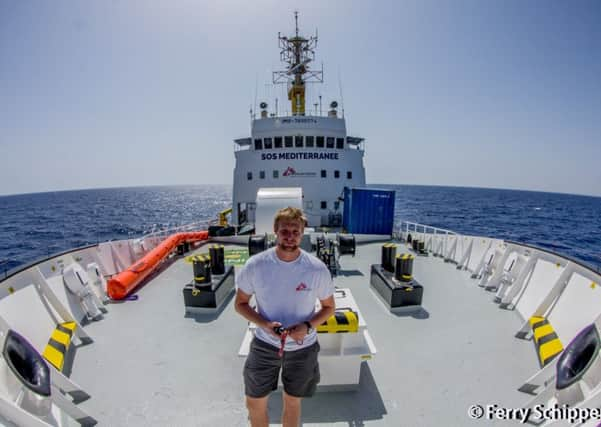Man from Duns Tew joins international medical charity to help fleeing refugees


Edward Taylor was stationed as a logistician on board the MV Aquarius, a search and rescue ship which has been helping refugees attempting treacherous journeys across the Mediterranean sea.
Mr Taylor was responsible for food, shelter, water, sanitation and implementing security. Before joining MSF in 2015, Mr Taylor had been building houses in London.
Advertisement
Hide AdAdvertisement
Hide AdHe said: “I got into MSF because I wanted to do something a little bit different and I wasn’t really getting the most out of what I was doing in my job in London. I was working for very wealthy people in Chelsea building houses, and I couldn’t bring myself to discuss any more light fittings.
“I thought, ‘There’s got to something else out there that’s more worthwhile; maybe I could put some of my experience to better use?’
“It’s very humbling working for MSF because you actually get to see the positive impacts and what we are able to do, which is incredibly cool.”
Mr Taylor, who has lived in Duns Tew for 22 years, had to keep busy while on board to combat severe seasickness, but also got to see some beautiful sunrises – and dolphins.
Advertisement
Hide AdAdvertisement
Hide AdHe said: “When I first got there I couldn’t get over how amazing they were: this big, orange blob in the air shimmering and reflecting across the sea. And if you’re lucky you’ll see dolphins jumping out of the water. We’re quite spoiled for dolphins.”
During the ship’s biggest 48 hours, seven consecutive search and rescue operations were carried out. When conducting a rescue, the ship sends out a smaller working boat to distribute life jackets and transfer people to the Aquarius. Once on board the refugees are checked by the doctors.
Mr Taylor said: “The first thing they do is just go to sleep because they’re knackered. The next day it’s a bit more euphoric and they’re mucking about on the boat, socialising, because they know they’re safe.
“Then the mood changes again when we’re getting to the ports, it goes from euphoric and then the mood just suddenly drops. People don’t really know what to expect, what the next phase of the journey is.
Advertisement
Hide AdAdvertisement
Hide Ad“It’s not like they get rescued out of the sea and that’s it. They’ve crossed the desert, been subjugated, extorted in Libya, and now they really have a clue what’s next.”
He added he was motivated by helping others to safety.
“To be honest there’s no better feeling than getting people in distress out of the sea and on a boat where they’re safe.
“They are people who eat and breathe and have families.”
Mr Taylor is now on his fourth assignment with MSF, as project co-ordinator on the Aquarius, an old research vessel build in the 1970s now operating off the coast of Libya.